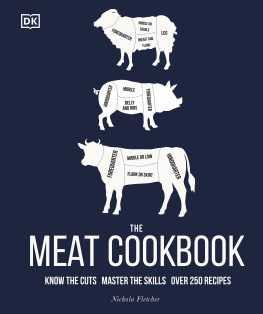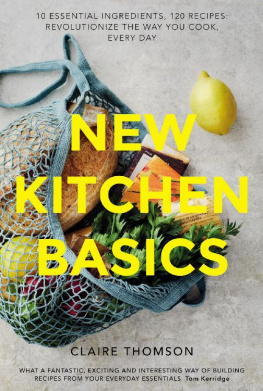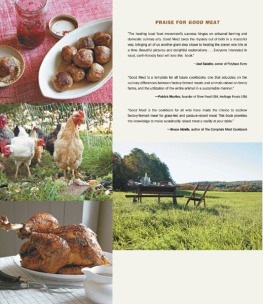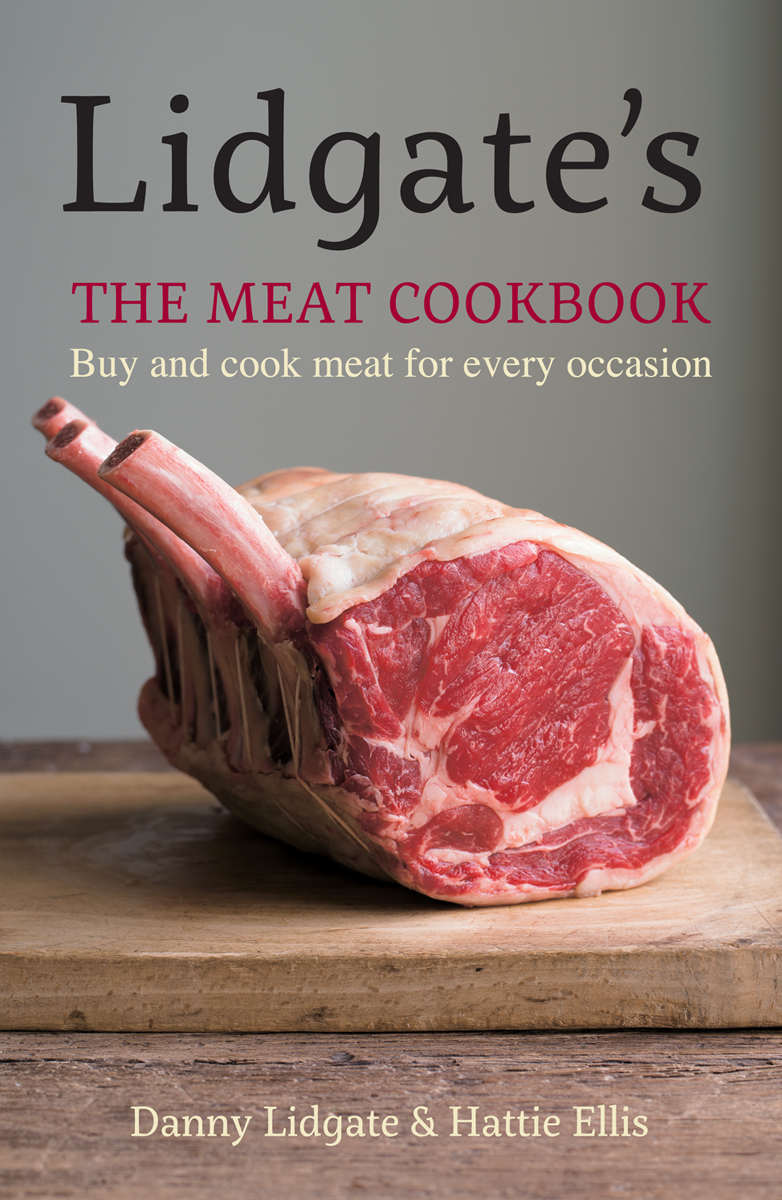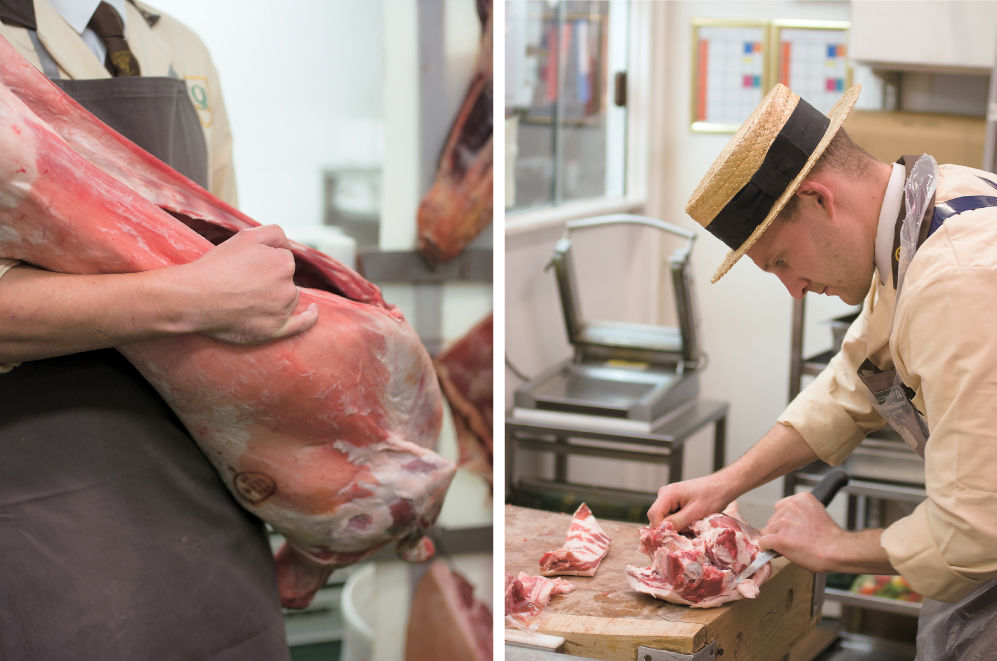

To David Lidgate and the Lidgate family, past, present and future
Contents
HOW TO USE THIS EBOOK
Select one of the chapters from the and you will be taken to a list of all the recipes covered in that chapter.
Alternatively, jump to the to browse recipes by ingredient.
Look out for linked text (which is in a different colour) throughout the ebook that you can select to help you navigate between related recipes.
Introduction
Lidgates is a fifth-generation butchers shop in the leafy streets of Holland Park, west London. As part of the proud tradition of British family butchers, it is a magnet for cooks, chefs and dedicated carnivores, who come in search of anything from a lunchtime sausage roll to a magnificent rib of grass-fed beef for a dinner party.
Weve written this book to share Lidgates specialist knowledge with meat-eaters everywhere. Its a collection of recipes, often developed in our own kitchen, that suit every occasion, from a midweek supper to a Sunday lunch, from a casual barbecue to a special celebration. It will also help you to discern a good butcher, choose the best meat, find out how to cook it and learn how to cut and carve it.
From past to present
Alexander Lidgate founded the family business in 1850, and was succeeded by his son Charles. It was hard work and the hours were long, but butchery is a sociable business. The family story goes that Charles would buy from Smithfield, Londons wholesale meat market, have a few beers afterwards with colleagues, and his horse could lead the meat-laden cart back to the shop unaided.
The business opened a new chapter in 1959 when 19-year old David Lidgate was thrown in at the deep end, having to manage the shop after his father retired due to ill health and then died young. David was a passionate rugby player, but suddenly had to focus his energy on the family shop indeed, to ensure it survived. Its said that an instinct for good meat is in the blood and he quickly developed a sense for good quality. He also studied the fine meat traditions on the Continent, and had an epiphany whilst visiting a village in Austria. Here he found a tiny shop run by an immaculately dressed butcher with gleaming knives. Pieces of meat were carefully set out on a wooden block, like items of jewellery, and behind the shop he discovered 10,000-worth of the latest butchery equipment. Nothing was wasted: every scrap of meat was turned into an astonishing range of high-class sausages. The days of spit and sawdust were over.
Once back home, David converted a room above the shop into a well-equipped kitchen, and Lidgates started to make sausages, pies, charcuterie and ready-to-eat dishes. Within a week of employing a cook to undertake some of this work, the shop display changed to ensure that passers-by stopped and shopped.
The rise of Lidgates as a modern butcher came at the time when meat-graders cared more about size and standardization than flavour. From 1981, beef had to be priced according to a European grading system that favoured fast-growing Continental breeds fed on cereals, rather than British cattle nurtured on grass that provided high-quality meat with relatively little maintenance. David thought this trend as ridiculous as pricing wine according to its bottle. A marker of this trend was that the renowned Perth Bull Sale went from selling nearly all native breeds to virtually none.
As farming and retailers headed largely in one direction, Lidgates went in another, deciding to prioritize the breed, feed and slaughter of the animal, how the meat was hung and cut, and all the other details that go into acquiring the best possible quality. Taste was all important a standard they upheld in a retailing world that favoured quantity over quality. Now the pendulum has swung back, with chefs and meat fans also favouring native breeds, grass-fed animals and top-notch quality. Discerning shoppers are once again appreciating what they can get from a specialist independent outlet.
Danny Lidgate, Davids oldest son, now heads the business. Like his father, he regards meat not just as raw cuts, but as food on a plate. As boys, he and his brother Ben glazed hams, helped carry customers bags to their cars, and handed out mince pies and mulled wine to the long Christmas queue. From the age of 17, he trained for four years in the Smithfield Unit of Walthamstow College, and worked in different places, from a cheap-and-cheerful London shop to Denmarks first organic butcher. He went back to the family shop with a broad perspective and took over the reins from David in 2009, at the age of 30, with Ben as company secretary the fifth generation of Lidgate butchers.
Go into Lidgates today and you will see many signs of the traditional business it has always been: an old-fashioned clock above the door, a framed horseshoe from the days when Lidgates salesmen took a horse-and-cart around the neighbourhood to drum up business, customers being served by butchers sporting boaters and deliveries made by drivers wearing ties. People still pay for their purchases at a separate cash desk at the end of the narrow shop, and here they can ask yet more questions about how to cook their meat. Yet theres a youthful energy from all the comings and goings in this early Victorian building, with its warren of rooms. There is the larkiness of butchers, but also serious craftsmanship and a great respect for their meat.
In the main cutting room behind the shop, a rotation of some 20 butchers uses the latest kit to turn carcasses into cuts that are ready to cook. In the kitchen above the shop, three or four cooks develop and cook recipes that make the most of the cuts and offcuts, including Lidgates versions of classics such as chicken and ham pie and Cornish pasties. A specialist sausage-maker turns out more than 20 different varieties of banger, all made freshly each day. Downstairs, the butchers think up new ways of making the most of meat, such as unusual kebabs and specially stuffed and tied roasts.
Some of the skills being passed down to apprentices go back to the old traditions of high-quality butchery established in the West End. Then as now, butchers learnt from working in a number of shops, and some Italian and French butchers put down roots in London and introduced their Continental practices. A spirit of cooperation and learning is fostered today by Lidgates membership of the Q-Guild, a group of UK craft butchers that strives to uphold standards and encourages visits to other shops. David Lidgate was instrumental in starting this organization in 1987 because he noticed how skills and knowledge were haemorrhaging from the trade as fewer family butchery shops were passing from father to son.
Like London itself, Lidgates is cosmopolitan and a hub of world food. The shops 34 staff come from many different places, including Brazil, Japan, France and Eastern Europe, and each brings his or her own particular crafts, ideas and recipes into the mix. As a specialist retailer, Lidgates must move with the times to survive and thrive.


